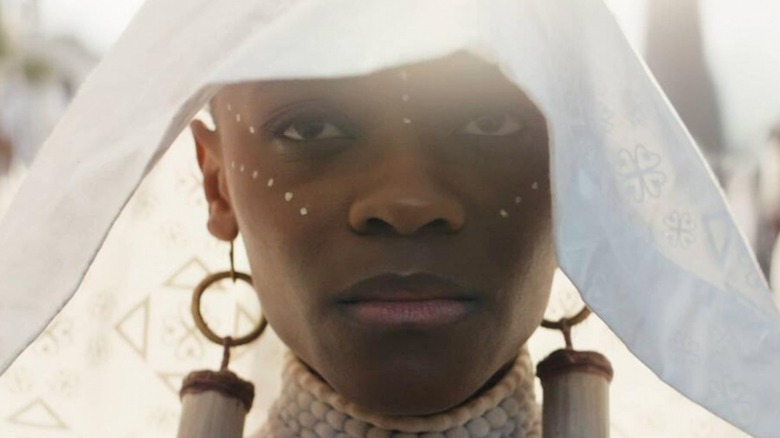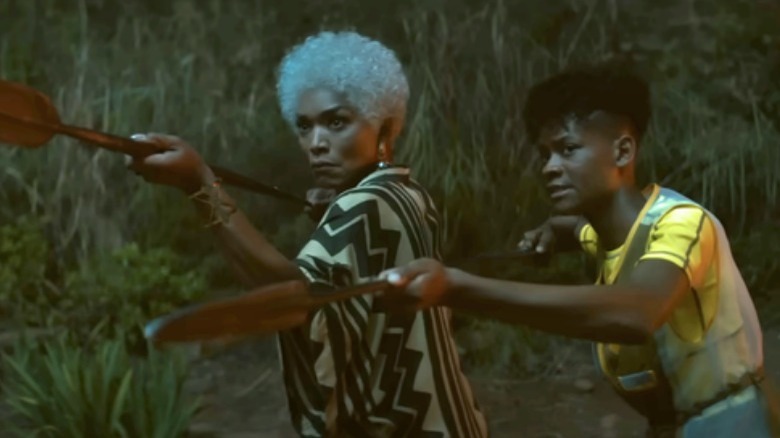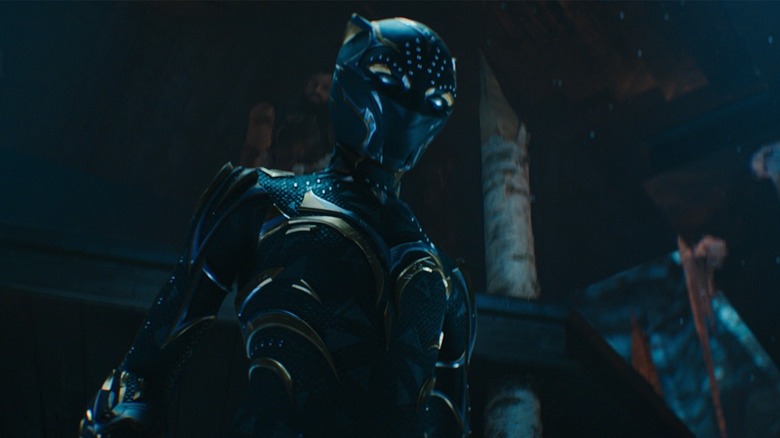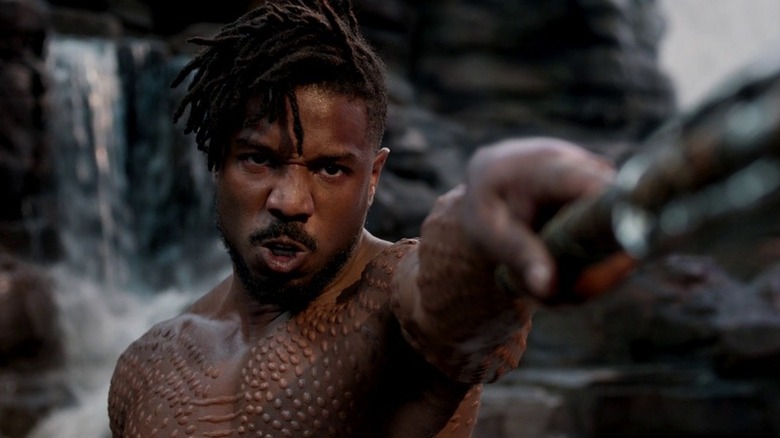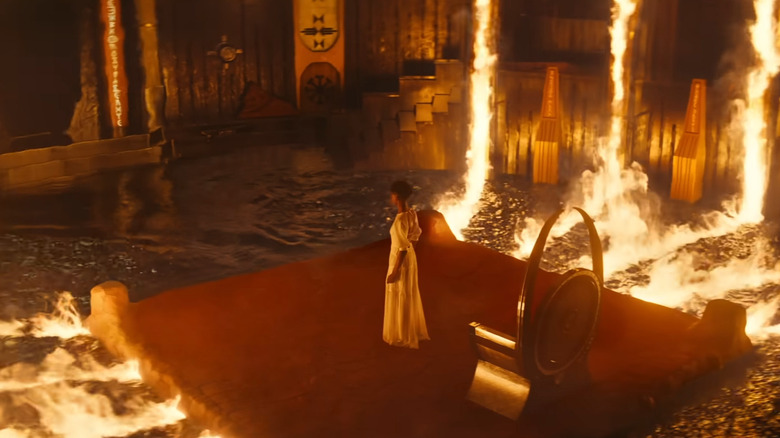Shuri's Turn Toward The Dark Side In Black Panther: Wakanda Forever Explained
Contains spoilers for "Black Panther: Wakanda Forever"
While it's a common issue from some fans that films don't stay true to the comics, the Marvel Cinematic Universe has still managed to make things work. Power sets may have changed, and origin stories may have altered, but that hasn't stopped the world of thunder gods and now advanced beings from the darkest depths of the sea from crashing into this world and making a space for themselves. In the case of "Black Panther: Wakanda Forever," though, there's one hero, in particular, that has had a drastic change from their origin story, one that could provide a whole new terrain for the first steps in a hero's journey.
"Wakanda Forever" ended with only one remaining member of the Panther tribe (or so it would seem before the post-credits scene) to watch the throne, changing the secret and highly advanced nation forever. Heavy is the head that wears the crown, though, and it becomes apparent that Shuri (Letitia Wright) is veering away from the noble and just way of ruling as her brother did. With fresh young eyes to look forward to Wakanda's future, what does it mean for the kingdom Shuri is now tasked to rule and the Marvel Cinematic Universe as a whole? Also, how much does this path divert from the one her character has in the comics, and what kind of dark territory could it take us to when the Black Panther returns?
Shuri's dark edge was teased early on in Wakanda Forever
Early on in the lengthy runtime of "Black Panther: Wakanda Forever," Shuri's dramatic shift in attitude is teased. As she tends to her sick brother, King T'Challa (the late Chadwick Boseman), by attempting to synthesize the Heart-Shaped Herb in her lab, she prays to Bast, the Panther Goddess. During her plea to the Wakandan diety, Shuri fleetingly mentions that she has doubts about the goddess' existence and admits her faith is more than a bit shaky. When T'Challa dies, Shuri seemingly loses all faith in Wakanda's idols, burying herself in her scientific studies as a coping mechanism instead of seeking peace through a higher power.
While there's nothing inherently wrong with charting a different course when it comes to her beliefs, there is something very concerning about Shuri's overall mentality post-T'Challa's funeral. A year later, her mother, Queen Ramonda (Angela Bassett), requests she sit with her by a river. They talk about how they've processed T'Challa's death, and Shuri doesn't hide the fact that she's making her way down a dark, destructive path. She confesses to her mother that the longer she thinks about her sibling, the more it makes her want to see the world — and everyone in it — burn. That's a far cry from the wise-cracking tech prodigy we met in the first "Black Panther" film.
Shuri stands alone but is not a stand-in Black Panther
In a Phase that has seen heroic mantles passed to others brave enough to take them on, Shuri follows in the lines of a new Captain America and a fleeting but mighty Thor. It might have been a shock for some, but it's nothing new for fans of the comics the films are inspired from. However, Wakanda's new queen's case drastically differs from when she stepped in as the Black Panther on the page. Unlike in the original film, Shuri in the comics had full intention of becoming the first female Black Panther, only to be bested by her older brother T'Challa in 2005. Only during the story arc of Dark Reign after the king's life was in danger did his sister take the title of Wakanda's protector in 2009 until T'Challa was back to full health and able to continue his previous duties (via Fandom).
Sadly, this is not the case in "Black Panther: Wakanda Forever." Following Chadwick Boseman's passing leading to T'Challa dying off-screen from an "unknown illness" as well as Queen Ramonda's death, Shuri accepts that her home still needs its protector and finally answers the call to follow in the tradition she used to scoff at. Shuri is, for now, the official Black Panther, and it's a task that understandably takes its toll, culminating in a personal journey that turns a classic hero trope on its head in a fascinating way.
A family reunion fuels revenge for Shuri
"What's in there?" "Only what you take with you." It's a classic back-and-forth between Luke Skywalker and Yoda in "Star Wars: Episode V – The Empire Strikes Back," which leads to our Jedi-in-training being warned of what the future could bring if he's not careful. In the case of Shuri in "Black Panther: Wakanda Forever," it seems she's made her decision before she realizes it, manifesting itself in someone she never hoped to see again during her trip to the Ancestral Plane. After taking her Heart-Shaped artificial Herb, her hopes of being greeted by her mother or late brother for counsel are quashed when the air turns deathly cold, and none other than Erik Killmonger (Michael B. Jordan) greets her with harsh truths.
Doing so awakens a side of Shuri we've never seen before as a conversation unfolds that hits the same vibe of "search your feelings; you know it to be true." Killmonger is Shuri's Vader, giving her the answers she'd been fighting to accept and the ramifications of what that looks like if she acts on them. She wants retribution, and here it is. A former threat who invaded Wakanda with the same mindset the young queen has to protect it. Shuri might see it as righting a wrong, but it's revenge, plain and simple, and though she only comes close to acting on it, it's clear that she still has an inner turmoil that could ripple out into Wakanda's future.
Is Shuri headed into dark waters after Wakanda Forever?
Besides being a film depicting the various forms of grief, "Black Panther: Wakanda Forever," like its predecessor, brilliantly demonstrates the different views that can lead to actions not everyone may agree on. Shuri has always stood apart from her family and Wakanda's beliefs and perspectives, and here it becomes even more apparent. Defiant in tradition and willing to go against the rules if necessary, the new queen we leave to watch over her homeland is a far cry from the playful princess we met back in 2018, which could spell tensions beyond the depths of Talochan.
Peace may be restored to both worlds above and below the water, but doing so feels like Shuri has gained an edge that her brother lacked and that her cousin has succeeded in igniting. "Vengeance has consumed us," she tells Namor (Tenoch Huerta), echoing that of T'Challa in "Captain America: Civil War," who managed to temper his bloodlust better than his sister did. Might that hunger return should another enemy cross Wakanda's borders? Could it cause unease among the ranks, especially given that no one knows who she saw in the Ancestral Plane even when Nakia (Lupita N'yongo) asked her? All of these questions, if answered, could lead to a new, more tense time in Wakanda and an unexpected era. The Black Panther will return, but will it be one to be welcomed or be weary of?
